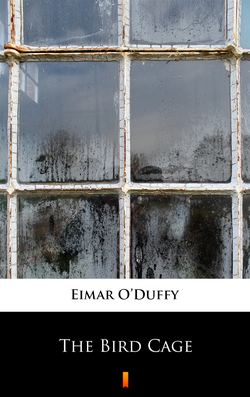Читать книгу The Bird Cage - Eimar O’Duffy - Страница 5
Оглавление[II]
ON THE TRAIL
The room was a large and bright one, with heavy expensive-looking furniture and deep-piled blue carpet. Through the long French windows the morning sun shed brilliant slanting rays.
Inspector Cranley turned his attention at once to the corpse. Clad in pajamas, it lay on its back, half-covered by the bedclothes, with the hideously maltreated head on the pillow. The neck showed dark bruises that could only have been made by throttling fingers, and there was another bruise on the abdomen, as if the murderer had knelt on his victim. The latter had evidently resisted, so far as the disadvantage at which he had been taken allowed, for his fists were clenched, and one of them was badly cut, while a cameo ring which he wore was broken.
Here Cranley’s investigation was interrupted by his catching a glimpse of what was obviously the instrument of the crime, a large and heavy hammer, the head of which was dabbed with blood, with some of the victim’s hairs adhering. He took it up and scrutinized the handle closely with a lens for finger-marks; but there were none. The nature of the brown smears on the wood told plainly that the murderer had worn gloves: a cool hand, evidently, carrying out a well-premeditated crime.
Putting the gruesome implement aside, Cranley now turned to the dead man’s belongings. On the small table by the bedside were a silver watch, which was going, a bunch of keys, and a volume of fiction, with a pair of shell-rimmed glasses between the pages. There was also the large key of the room, with the number plate attached. Other personal accessories lay on the dressing-table: some loose change, a fountain-pen, and a pocket-book containing eleven pounds in Treasury notes, besides the usual toilet requisites. A light raincoat hung from a hook on the door, and the man’s other clothes lay on a chair at the foot of the bed, all but the coat, which the inspector found hanging in the wardrobe. Against the wall stood a large black trunk, unlocked, but not yet unpacked. It was marked at both ends with the initials, W. W., in white paint. There was a tie-on label fastened to each of the handles, having the inscription: W. Wilson, passenger to Spurn Cove; but the railway company’s adhesive label was missing.
Cranley next went to the windows. The right-hand one was shut and latched; but the other was merely closed; and the detective at once saw that a circular piece had been cut out of the glass near the latch. A moment later he found the piece on the dressing-table. A slight discoloration in the center marked the point of adhesion of the putty with which it had been retained in position during the cutting operation; but the putty itself was not to be found, and the glass, like the hammer, proved to be innocent of finger-prints.
Opening the window, the inspector proceeded to examine the balcony for footmarks, and here at last obtained some reward for his pains. The indications were indeed faint, but one of them was definite enough for exact measurement. For all the violence of his assault on his victim, the murderer was evidently not a man of extraordinary physique, for his foot was only a size seven.
Having come to this conclusion, Inspector Cranley stood for a moment looking out at the prospect below. The town of Spurn Cove, as we have said, is very nicely situated on a curve of the coast, not deep enough to be called a bay, with wooded country behind it. From the balcony of the hotel, which stood on the southern point of the arc, Cranley could see the clustering roofs and spires of the town, and the flash of its windows in the morning sun. Beyond the glittering waters of the bay, now dotted with the heads of swimmers, with here and there the white sail of a pleasure boat, the curvature of the shore terminated in another promontory, with scattered red roofs among a mass of trees. Altogether it was a charming view; but the detective’s thoughts were elsewhere. It was evident that the dead man had expected an attack of some kind; for it is unusual in these days for anyone to keep his bedroom windows closed, especially in summer. And the murderer had obviously come prepared for this. But how, Cranley asked himself, could he have counted with confidence on scaling the balcony, cutting the glass, and opening the window, without disturbing the sleeper? More extraordinary still, how had he succeeded? What catlike tread, what deft unerring fingers, what infinite patience the midnight prowler must have owned. Cranley could picture him, gloved, rubber-soled, lithe-bodied, opening the window inch by inch, then creeping softly as a snake to the bedside to deal his deadly blow.
The fell work had gone without a hitch. No slip by the murderer: no cry from the victim. In the dark too; for the moon was in her third quarter. There was something like wizardry in the achievement, unless the man in the bed had been uncommonly deaf.
Deaf? He had better inquire about that. He went to the telephone in the corner of the room and took up the receiver.
“Hello! Is that Miss Philpot;... Me... Don’t you know?... Yes, it’s me, darling. I’m working on this murder... Yes... Now, look here. Did you see this man when he arrived last night?”
“Yes,” replied Miss Philpot.
This is a free sample. Please purchase full version of the book to continue.
